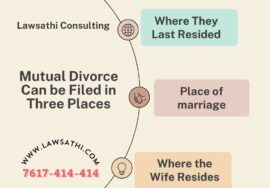How to file for mutual divorce in India?
In India, the process of filing for a mutual divorce is less complicated than that of a disputed divorce. An amicable divorce occurs when both spouses consent to the dissolution of their marriage. This is a detailed guide explaining the process of filing for a mutual divorce in India:
Steps to File for Mutual Divorce in India
Mutual Agreement:
Both spouses must agree to the divorce and the terms of separation, including child custody, division of property, and alimony (if applicable).
Prepare the Petition:
Draft a joint petition for divorce under Section 13B of the Hindu Marriage Act, 1955 (or relevant section under the Special Marriage Act, 1954 for inter-religious marriages).
The petition should include statements that both parties have been living separately for at least one year and that they have mutually agreed to dissolve the marriage.
Sign the Petition:
Both parties must sign the petition. It should also be signed by their respective lawyers.
File the Petition:
Submit the signed petition to the family court having jurisdiction over the area where either spouse resides.
First Motion Hearing:
The court schedules a hearing for the first motion. Both parties must appear in court with their lawyers.
The court reviews the petition and verifies the consent of both parties.
The court records the statements of both parties.
Cooling-Off Period:
After the first motion, there is a mandatory six-month cooling-off period to give the couple time to reconsider their decision.
In exceptional cases, the Supreme Court of India allows for this period to be waived, but it typically requires a strong justification.
Second Motion Hearing:
After the cooling-off period (six months and within 18 months from the date of the first motion), the couple must file a second motion.
Both parties must again appear in court.
The court reviews the case, verifies that there has been no reconciliation, and confirms the mutual consent for divorce.
Granting of Divorce Decree:
If the court is satisfied that all legal requirements are met and that both parties still consent to the divorce, it grants the divorce decree.
The decree dissolves the marriage legally, and the divorce is finalized.
Documents Required
Joint Divorce Petition: Signed by both parties.
Address Proof: Proof of residence for both spouses (Aadhaar card, passport, voter ID, etc.).
Marriage Certificate: Original or certified copy.
Photographs: Passport-sized photographs of both spouses.
Statements: Statements of both parties confirming mutual consent.
Income and Property Details: Information about assets, liabilities, and incomes (if required).
Benefits of Mutual Divorce
Speed: Faster than a contested divorce since both parties agree.
Cost: Less expensive due to fewer legal fees and court appearances.
Less Stressful: Amicable resolution reduces emotional stress.
Tips for a Smooth Process
Legal Advice: Even though it’s a mutual divorce, consulting a lawyer helps ensure all legal aspects are covered.
Detailed Agreement: Clearly outline all terms of the agreement to avoid future disputes.
Documentation: Keep all documents organized and accessible.
Conclusion
In India, the procedure of filing for a mutual divorce is less complicated, and faster, than filing for a disputed divorce. Couples can end their marriage peacefully and go on with their lives by according to the legal procedures and making sure that all agreements are agreed upon by both parties.
Contact Information: You may contact us for your queries for divorce, and mutual divorce. We are the expert and experienced team.
Lawsathi Consultation (LSC Lawyer) (Law Sathi Consultation)
Phone:- +91 7617 414 414
Email:- lawsathi@gmail.com
Website:- https://lawsathi.com
Common questions and answers
1- How to file for mutual divorce in India?
Filing for mutual divorce in India involves several steps, and it’s important to follow the legal procedures to ensure a smooth process.
Consultation with a Lawyer: Prepare Joint Petition: Gather Required Documents: File the Petition: First Motion Hearing: Cooling-off Period: Second Motion Hearing: Decree of Divorce: Execution of Divorce Decree:
2- What documents are required for mutual divorce?
Wedding Card. Marriage Photograph. Passport size Photographs. Financial Affidavits. Property Settlement Agreement. Parenting plan (if applicable). Proof of residence and other relevant document.
3- How long does mutual divorce take in India?
In India, the time taken for mutual divorce proceedings can vary depending on various factors, including court workload, completeness of documentation, and mutual agreement between the spouses. However, typically, mutual divorce in India can take around 6 months to 18 months or more to be finalized.
4- What is the procedure for filing mutual divorce in India?
Procedure of filling mutual divorce is very simple- If both the parties agreed for mutual divorce than they need to talk to lawyer who is experienced and expert in family matters. They will guide you proper.
5- What are the advantages of a mutual consent divorce?
Time Efficiency: Reduced Emotional Stress: Efficiency: Resolution: Saves Resources: Potential for Reconciliation: Cost-Effective: Privacy and Confidentiality:
6- What are the grounds for divorce in India?
In India, divorce can be granted under various grounds as specified by different personal laws applicable to different religions. Here are the commonly recognized grounds for divorce across different laws: Adultery: Cruelty: Desertion: Conversion: Mental Disorder:
7- What is fee for mutual consent divorce?
The fee for mutual consent divorce in India varies depending on several factors, including the court where the divorce petition is filed and the lawyer’s fees.



